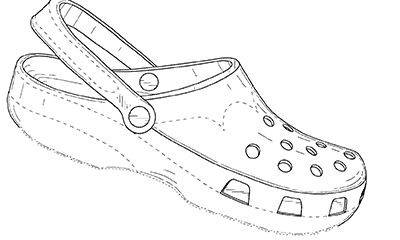
Mojave Desert Holdings v. Crocs
MOJAVE DESERT HOLDINGS, LLC, Appellant v. CROCS, INC., Appellee
Appeal from the United States Patent and Trademark Office, Patent Trial and Appeal Board in No. 95/002,100.
ORDER ISSUED: February 11, 2021 ORDER MODIFIED: April 21, 2021
U.S.A. Dawgs appealed from a United States Patent and Trademark Office decision finding Crocs design patent (No. D517,789) patentable. U.S.A. Dawgs and Mojave Desert Holdings moved the Court to substitute Mojave as U.S.A. Dawgs’s successor-in-interest pursuant to Rule 43(b) of the Federal Rules of Appellate Procedure. The Court granted the motion.
Crocs sued U.S.A. Dawgs for infringement of the ’789 patent in the United States District Court for the District of Colorado. U.S.A. Dawgs filed a request for inter partes reexamination of the ’789 patent at the USPTO. The examiner rejected the claim. Crocs appealed to the Patent Trial and Appeal Board.
While the appeal was pending before the Board, U.S.A. Dawgs filed for Chapter 11 bankruptcy. The bankruptcy court approved the sale of U.S.A. Dawgs’s assets to Dawgs Holdings, LLC. Dawgs Holdings subsequently assigned the assets, including all claims against Crocs, to Mojave.
Later, Mojave filed a petition with the Board to change the real-party- in-interest to Mojave in the inter partes reexamination. The Board dismissed Mojave’s request. First, the Board found that Mojave’s submissions were insufficient to establish Mojave as a real party-in-interest and/or requester because the initial transfer of assets from U.S.A. Dawgs to U.S.A. Dawgs Holdings, LLC appeared to be silent about rights with regard to the inter partes reexamination proceeding. Second, based on its interpretation of the transfer of assets, the Board rejected Mojave’s filing because Mojave was “not a party to the instant inter partes reexamination proceeding” and did “not have standing to update the real party-in-interest in the proceeding pursuant to 37 C.F.R. § 41.8(a).” Third, the Board concluded that Mojave did not file its submission “within 20 days of any change [of the real party-in-interest] during the proceeding,” as required by 37 C.F.R. § 41.8(a).
The Court found that U.S.A. Dawgs’s assignment of all of its assets to Dawgs Holdings through the bankruptcy sale was “comprehensive.” The transfer of all of U.S.A. Dawgs’s assets on its face included the rights in the Board proceeding. In the second assignment, Dawgs Holdings assigned Mojave litigation claims, and specifically enumerated its interest as the requester in the inter partes reexamination.
The Court did not read 37 C.F.R. § 41.8(a) as permitting the Board to ignore a transfer of interest in an inter partes reexamination that has been assigned to a successor-in-interest, stating that “[t]he purpose of the rule is to detect conflicts of interest and to enable enforcement of inter partes reexamination estoppel provisions,” and that “the rule is not directly related to substitution.” Further, the Court stated that in the federal district courts, there is no time limit attached to a party moving for substitution on the basis of a transfer in interest. Fed. R. Civ. P. 25(c).
Crocs also argued that the interest of a requester cannot be assigned under the statute governing appeals from inter partes reexamination pursuant to 35 U.S.C. § 141. Distinguishing cases where the right to exclude was separated from the right to sue for infringement, the Court saw no reason to prevent transfer of the right to challenge the Board’s decision, since the requester’s right was transferred together with liability for past infringement.
Crocs argued that Mojave lacks Article III standing because it did not face a potential suit for infringement. The Court disagreed since Mojave acquired U.S.A. Dawgs’s false advertising counterclaims subject to “any rights to setoff or recoupment” by Crocs. Crocs’s infringement claim, if successful, would reduce Crocs’s liability on Mojave’s false advertising claim. The Court further stated that an injury to Mojave, required to establish Article III standing, is traceable to the ’789 patent asserted by Crocs in the District of Colorado litigation, and would be redressed by a reversal of the Board’s finding of patentability of the ’789 patent.
Crocs further posited that Mojave failed to file a notice of appeal from the Board’s decision. The Court noted that “Mojave could not file a notice of appeal because it had not been added as a party by the Board to the inter partes reexamination proceeding.” However, U.S.A. Dawgs retained the ability to file a protective notice of appeal. U.S.A. Dawgs filed the notice, which was sufficient to confer jurisdiction on the Court.
Read more: Federal Bar member attorneys may access the full case summary by registered patent attorney B.C. “Bill” Killough in the April 2021 issue of Federal Circuit Case Digest
 B.C. Killough is a registered patent attorney based in Charleston, SC. On behalf of his clients, Bill has obtained more than 300 United States patents, participated in prosecuting more than 100 foreign patent applications and he has filed more than 1000 trademark applications with the US Patent and Trademark Offices.
B.C. Killough is a registered patent attorney based in Charleston, SC. On behalf of his clients, Bill has obtained more than 300 United States patents, participated in prosecuting more than 100 foreign patent applications and he has filed more than 1000 trademark applications with the US Patent and Trademark Offices.